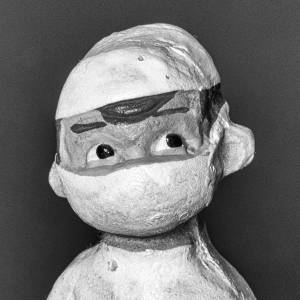Fanlight!
Back in December, fellow blipper pooba kindly described his technique for photographing the coloured patterns which can be produced in plastics when both illuminated and viewed through polarising filters. I didn't know until then that the light from a flatscreen monitor is polarised, and therefore provides a very convenient polarised light source.
Over the months, Pooba and others have blipped a variety of patterns produced in this way. I've been itching to have a go myself, and realised that we had an old plastic 22cm computer case fan lying around. It seemed an ideal object to experiment with. As one turns the filter on the camera, the background changes from white to black, and the coloured patterns change; I decided I preferred the black background but may try it in other ways as well in future.
In spite of having had a fair bit of optical training in my career, I still find the phenomenon a bit difficult to understand. As far as I can tell, the patterns result from birefringence and interference. With birefringent materials, it seems that the refractive index of the material depends to some extent on the polarisation and direction of the incident light. I guess this means that, depending on the shape of the plastic, light entering different bits of the plastic is entering at different angles and is differently polarised relative to the plastic itself. This must result in the light rays being refracted (bent) differently as they enter and leave the plastic, thereby being split into multiple rays which take slightly different paths. When these meet they will interfere with each other as they will no longer be in phase, a given different path length having different effects on different wavelengths (ie different colours). I assume you need the polariser in the camera as well in order to selectively view the affected light rays...but I'm even more hazy on that aspect!
It must, I suppose, be similar to the interference colours one sees when a very thin layer of oil covers a puddle of water.
(If any clever blippers out there reckon I've gone wrong in my explanation then please feel very free to say so!!)

Comments
Sign in or get an account to comment.


